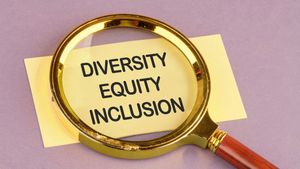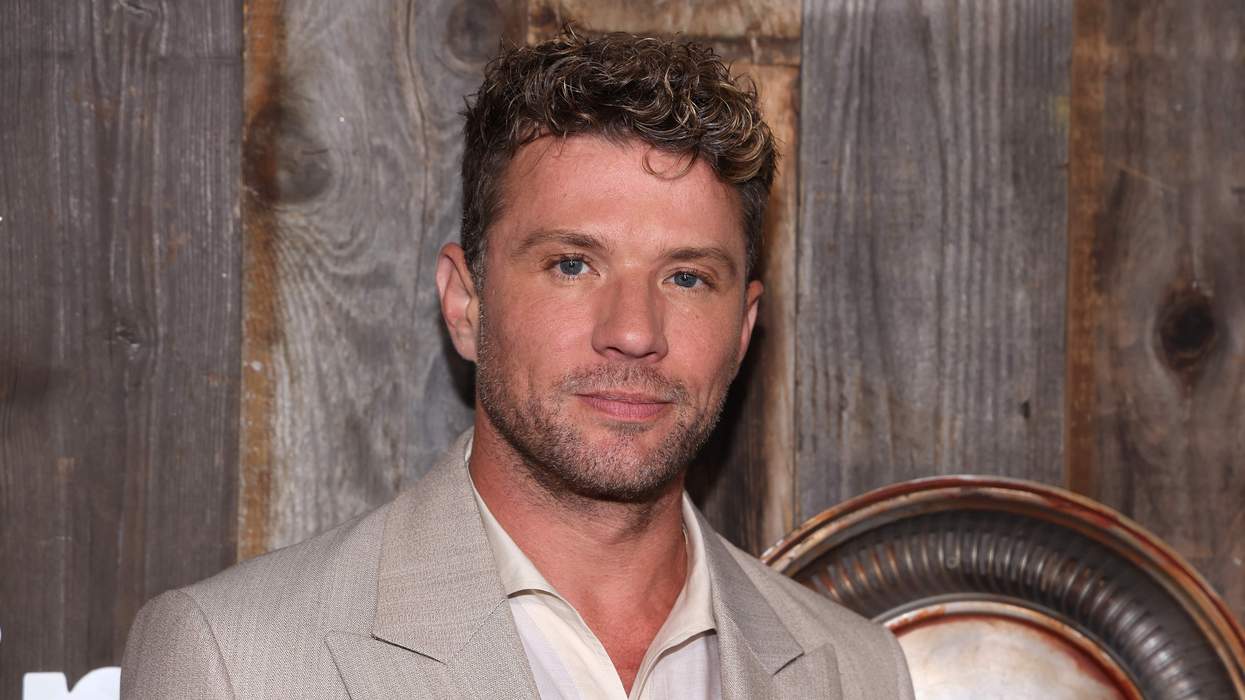There’s a lot of inertia around relationships.
 These are 15 reasons why it might be time to call it quites.wavebreakmedia/Shutterstock
These are 15 reasons why it might be time to call it quites.wavebreakmedia/ShutterstockOften, it’s easier to stay in something even though you know it’s not working or not what you really want than initiate the trauma of ending it and an uncertain future.
“Ending a relationship is a major emotional risk. Most people stay in limbo far longer than they should because they fear regret, loneliness, or hurting someone they love,” couples therapist Thomas Westenholz tells PRIDE.
A big reason people start is simply the uncertainty. Should you stay? Should you go? Will you regret it if you leave? It's hard, and we've all been there. But deciding when to cut ties or when it’s worth trying to salvage your relationship can be even trickier for LGBTQ+ people.
“I think most LGBTQ+ people are less conscious of these signs, especially those whose coming out was particularly difficult or traumatic, because having a successful relationship means more to them than just personal happiness,” explains Angie Reyes, a relationship expert and the general manager at Wiselaw. “It's almost like they build their entire world around the relationship, investing so much emotional energy into it, partly because their support network is often limited and fragile, and this makes it harder for them to see even the most obvious signs that their relationship is at the brink of an end.”
Thankfully, some sure signs can help cut through the confusion. Here's when it's time to just let go and move on.
1. You’re both unhappy – and have been for a while

Shutterstock
All couples go through bad patches, particularly over the long haul. There are always pressures from outside – jobs, kids, distances, families, friends – and occasional tensions between you, especially when you’re years in, living together and grappling with self-realization at the same time as being part of a couple.
But with talking and communication and a certain amount of effort from both parties to prioritize the relationship and compromise on whatever’s causing the problem, it really is possible to come through stronger.
The trouble comes when one person refuses to acknowledge the validity of the other’s feelings or prioritize the relationship. “This can be seen as an overall general negative mood that can be felt palpably throughout the relationship,” says Christopher Pollock, a licensed marriage and family therapist and LGBTQ+ couples specialist. “You may be avoiding one another even if you live with your spouse. Many people act out with anger or rage when they’re grappling with indecision.” Everyone’s unhappy sometimes, but it’s how the relationship deals with it that’s really a test.
If your partner’s repeated response to your raising issues or needs is to a) ignore them, b) tell you you’re wrong, c) lie, and/or d) refuse to modify their behavior, get gone already. If said unhappiness is due to you/your partner being emotionally abusive in any way, LEAVE NOW AND DON’T LOOK BACK.
2. Everyone knows something is wrong

Shutterstock
This doesn't always have to be a tell-tale sign, because it's not usually anyone else's business what's going on in your relationship. People are always going to theorize and make assumptions and judgments based on what they see, and there's really nothing you can do about that.
However, if your closest friends and family are constantly either walking on eggshells when it comes to the topic of your relationship or outright telling you it's time to call it quits, it may be worth considering. If you trust them and you trust that they have your best interest at heart, it may behoove you to heed any warnings they're giving you when you already know it's time to get out.
“It's always better to end a relationship on a peaceful and agreeable note, than to let things escalate. If you are both unhappy, and everybody knows something is wrong, then it might be a good time to have a clarifying conversation that leads to the next steps,” Reyes says.
3. You've lost trust in them

Shutterstock
Trust and communication are incredibly important in relationships. If you can’t build trust, or if the trust you had is gone, it may be a sign that your relationship is falling apart. If you’re finding this to be the case, it may be important to do some self-reflection and find out why the trust is gone. Are either of you doing anything different? Do you have any tangible proof, or is it just a feeling? More importantly, have you tried to talk to your partner, or are you just making assumptions? There may be ways to rebuild trust, but if not, it might be time to say goodbye.
“Trust can be rebuilt, but it takes time, dedication, and a partnership to do so,” Pollock says.
4. One (or both) of you starts cheating

Shutterstock
There’s a huge difference between being in an open relationship and cheating. Open relationships mean your partner knows who you’re doing what with, and maybe even joins you here and there.
Cheating is when your significant other has no idea who you’re with and you’re keeping secrets about it. It’s possible to cheat while in an open relationship, but the difference, again, is the knowledge your partner has of the interaction.
If one or both of you is sneaking around behind the other’s back, your relationship might be on the rocks.
“If you don't trust each other anymore, one partner starts cheating, you are both constantly blaming each other, never seeing eye to eye or able to compromise even in the smallest of matters, and don't express affection in other ways but sex, then that is a huge red flag that there is not enough affection to support your relationship,” Reyes admits.
5. You've lost respect for each other

Shutterstock
According to Westenholz, respect and trust are the two pillars of a healthy, long-term relationship, and without them, everything falls apart. “Lost trust or respect? Trust is the floor; without it, everything collapses,” he says.
If you don’t respect your partner, how can you expect to have a loving and fulfilling relationship? That also goes both ways, because it’s equally important to be respected as it is to offer up respect. However, if you’re finding the respect you have (or had) is starting to dwindle, your relationship may be on its way to the grave.
6. Both of you blame the other

Shutterstock
This is a tricky one because sometimes one partner is more reasonable and responsive than the other, so blame can often be justified. (See previous – if one person’s being abusive, just go already.) But a toxic environment of resentment and mistrust where neither of you feels able to trust the other to meet your needs or look after the relationship is probably not worth saving if, despite nearly endless conflict, neither of you seems able to improve things.
When you play the blame game and aren’t affectionate with one another, it may be time to say goodbye. “If you’re more like flatmates or enemies than partners, something’s broken,” Westenholz says.
Maybe make a last-ditch attempt to negotiate and/or salvage something from the wreckage, and if that doesn’t work out, let things go. If you feel constrained by the other person more than you feel cultivated, and you blame them for that, it's very difficult for blame and recrimination not to be bubbling away beneath the surface.
7. You don’t touch (or express affection in other ways) anymore

Shutterstock
Okay, so some couples aren’t very physically affectionate to start with, so if this is you, feel free to replace touching with your preferred level and type of affection. But every relationship is held together by quotidian reassurances that you love one another and have a bond, whether that’s verbal affection or secret love notes, filthy texts, or physical affection, or some combination of the above. (As a very touchy-feely and very verbal person, I need it all, all the time. Fortunately, my partner is similarly inclined.) If that stops, and you’re living together but not touching affectionately or saying loving things, or focusing on making the other person happy, then the relationship is basically an empty shell.
“People respond differently to love languages. Knowing your partner’s love language is vital to the success of a relationship,” Pollock explains.
Whether it’s because the feelings and impulses aren’t there anymore for you or the other person just feels so distant that you can’t reach them, it’s definitely time to have a proper sit-down chat about “what the hell we are doing here?” Or “can we make it better?” And if not, “should we stop?"
8. You are always thinking about ending it

Shutterstock
Either in terms of “if I were single I would,” or wondering whether you ought to, or knowing you ought to but not knowing how. If you‘re constantly trying to reassure yourself that you should stay but struggle to come up with reasons why, then clearly your subconscious already knows it’s over, even if the rest of you is taking a while to catch up.
If this is true for you, then it’s probably time to end things, Pollock says, “When we always seek a way out or termination, it leaves little room to work with regarding finding common ground and connecting.”
9. You're sabotaging the relationship

Shutterstock
Lots of people try to sabotage relationships – intentionally doing things that will hurt or annoy the other person, breaches of trust, pushing their boundaries in the hopes they’ll end it so you don’t have to. The new toxic dating trend “banksying” is just one way people sabotage relationships in the hopes that you’ll end it for them or so that they are set up for success when the time comes to pull the plug.
“Many people self-sabotage when they struggle with indecision. They don’t want to make a decision. Therefore, they will do what they can to allow the other person to make the choice,” Pollack explains. “It’s easier to push someone away and allow them to terminate than for us to walk away ourselves.”
If this is you or your partner, just go already. If you’re so unhappy in the relationship, you find yourself doing things you can’t countenance or respect, like petty cruelties, then you need to leave for your own sake almost as much as the other person’s.
10. There’s more bad than good

Shutterstock
This is a pretty good rule of thumb, actually. If the bad times consistently outweigh the good times (for longer than the period where the good times outweighed the bad), then yeah, it’s totally time to go. If it’s a decade-long relationship of mostly good times and you have a few bad weeks (barring major betrayals), maybe hang in there and try to fix it. If you’ve been together for four years and have been consistently unhappy for at least the last two, then you need to either get out or work through it. If you find yourself only getting through the present of the relationship by thinking about how good things used to be, then part of you already knows it’s finished, and it’s just waiting for the rest of you to realize.
“If you don't laugh together anymore, have more bad moments than good, feel trapped in the relationship, or are both always finding ways to sabotage the relationship, then walking away is probably for the best,” Reyes shares.
11. You have fundamentally different life goals

Shutterstock
I am reaching the age where this is often about who wants children and who doesn’t, but it goes for any major ideological or practical goal. Not only in terms of practical commitments – like if you’ve always wanted to travel, so you take the exciting international job, while they are quite happy living in the town where they grew up with all their school friends – but in terms of ideological choices and preferences.
“We all have unique life goals. The important disconnect to identify is whether partners have different values. Those are the bedrocks of a relationship,” Pollock says.
Often, ending a genuinely good relationship is actually the right thing to do if you’re heading in different directions and changing tack would involve one of you giving up on a dream or changing who you are as people. Sometimes it’s better to split up and (after a decent interval) stay friends than stick around making one another unhappy.
12. You have nothing to say to each other any more – but somehow keep bickering anyway

Shutterstock
If nothing seems to connect you anymore other than being "in a relationship,” then said relationship is dead in the water. If there is no kindness between you and you find yourself (or your partner) saying or doing hurtful things simply because it’s the only way to emotionally reach the other person (or worse, not caring whether it’s hurtful or not), then it’s time to get out. That’s not a healthy situation for anyone. But neither are constant low-level disagreements.
If you can’t actually reach any resolution in areas of conflict and neither of you is willing or able to change your point of view, then there’s little point in continuing. If you can’t be honest with one another because you always end up arguing, then there’s no point in being together anymore. A perceptive friend once explained that differences in the way you argue can also destroy a relationship. If hearing someone raise their voice is tantamount to physical violence to you, but your partner finds that an acceptable way to express mild irritation, then it could be hard for you to resolve disagreements in a way that is comfortable for both parties.
“The most important things to do are honor your needs, hold your boundaries, present with honesty for yourself, and provide as much compassion towards the situation as possible,” Pollock explains. “Breakups are hard but sometimes necessary for growth. Lean into your support network as much as possible. Isolation is one of the biggest contributing factors to negative mental health disorders."
13. You don’t laugh together anymore

Shutterstock
In fact, the things you once found hilarious and endearing now bore or irritate you. If you’re having a bad day and being around the other person makes you feel consistently worse, not better, then you’re really not in a good place (particularly if it’s like this for both people). If what used to be a source of love and joy and succor and reassurance, even mid-crisis, becomes something difficult and/or draining, and you feel better away from it, then it’s time to end things.
“My honest advice for someone who realizes that their relationship should end, is to that they nip it in the bud immediately, because the truth is that, prolonging the inevitable really helps no one, it only makes healing harder, because the longer you stay in this relationship, the more hopeful you get, and the greater your disappointment when it eventually comes to an end,” Reyes says.
Again, this is potentially fixable, especially in the early stages, but it’s potentially fixable with a LOT of hard work and effort. It will likely take compromise, dedication, talking, and trying things, and then trying other things if they don’t work. If that all sounds like a bit much effort, then the writing’s on the wall and it says, “Get out.”
14. The sex is…not what you want or need

Shutterstock
We all know about the grim specter of Lesbian Bed Death, and we also know that often long-standing couples have less sex than newer ones for practical and emotional reasons. It’s not necessarily a problem if it’s not a problem for you guys specifically – some people are asexual or just not interested in prioritizing sex, which is fine. But if you’re both profoundly sexual people and yet you’re not having sex anymore – and perhaps more significantly, don’t want to have sex anymore – that is a bad sign. You don’t have to be having sex all the time – as one wise friend of mine says, “It can be infrequent, but it still has to be good” – but you do need to be enjoying it when it happens and have enough to keep you happy.
Westenholz says that if you’re feeling a sexual disconnect with your partner, it’s actually a really big deal. “These are big red flags. You shouldn’t feel caged in your own life.”
If you and your partner have always had wildly differing sex drives, there are ways of managing that (openness? masturbation? compromise?), but you do have to both acknowledge it as an issue that matters and deserves to be addressed. As someone with a sky-high sex drive, I just know that I couldn’t be fulfilled long-term in a relationship with someone who wasn’t interested in sex more than once a month after the first few weeks. We’d both be unhappy. That kind of mutual incompatibility is a dealbreaker. It’s nobody’s fault, but it won’t go away if you ignore it, and it’s much better to tackle the issue head-on than wait until somebody cheats or explodes or turns bitter and insulting.
15. You feel trapped, not enabled.

Shutterstock
When you’re in a happy and healthy relationship, you should feel like the best version of yourself. Like your partner enables you to not only be yourself, but be better and more fulfilled. If, instead, the relationship feels like a trap or a limitation, something you have to take into account but are no longer moving towards or flowering out of, then it’s a pretty good sign it’s not working anymore.
Worse, if your partner is continually placing emotional demands upon you, or interpreting your emotional needs as demanding, then you’re obviously heading in different directions. If they’re expecting you to save them – from mental illness, the hostile world, having to adult, whatever – but show absolutely no inclination to work on saving themselves, then you’d really be better off on your own than having to parent another adult (and it’s surprising how often this comes up).
If any of these resonate with you, then the experts say it might be time to bite the bullet and break up with your partner. No one likes a breakup, but it’s time to rip off the band-aid so both of you can move on with your lives. “The most important things to do are honor your needs, hold your boundaries, present with honesty for yourself, and provide as much compassion towards the situation as possible,” Pollock says. “Breakups are hard but sometimes necessary for growth. Lean into your support network as much as possible. Isolation is one of the biggest contributing factors to negative mental health disorders.”
Sources cited:
Thomas Westenholz, a couples therapist who is trained in Emotionally Focused Therapy, and co-host of the Couples in Focus podcast.
Angie Reyes, a relationship expert and the general manager at Wiselaw.
Christopher Pollock, a licensed marriage and family therapist and LGBTQ+ couples specialist at TheraVize.






























































